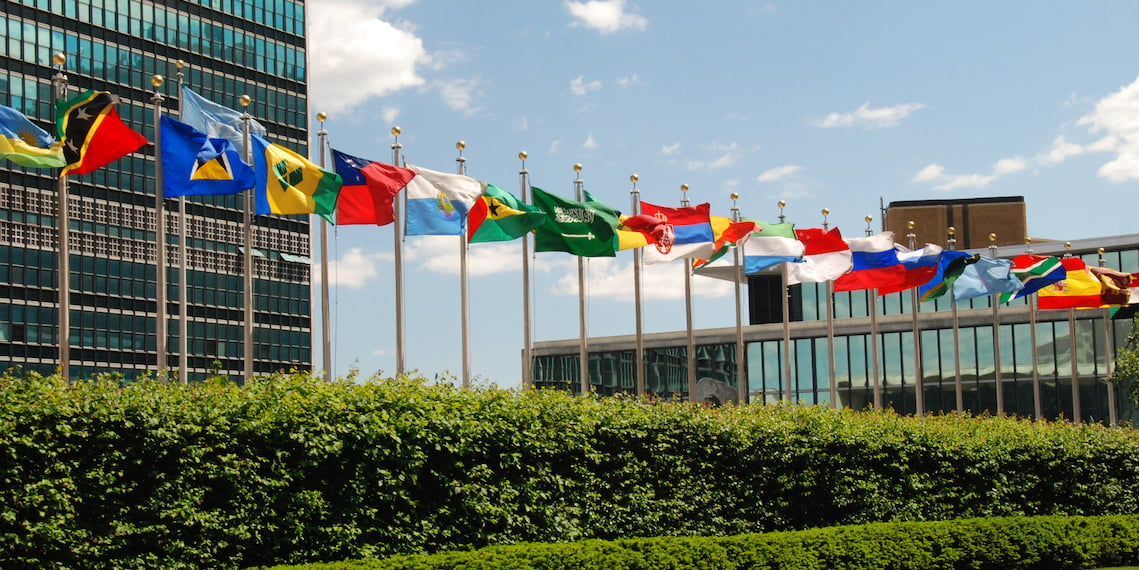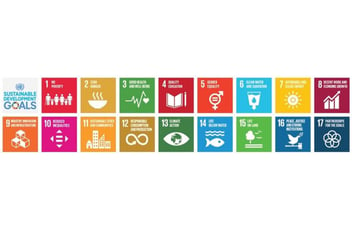YWPs advocate for urgent action on SDG6 on international stage

For the first time in decades, leaders, experts, academics, scientists and young people from across the world gathered in New York last month for the UN 2023 Water Conference to share insights and innovations, but also to address the urgent need to move on achieving SDG6 and climate resilience.
Jacobs Process Engineer and 2023 NSW Water Young Water Professional of the Year Chelsea Hayward was one of 14 international young water professionals (YWPs) selected for the International Water Association (IWA)-Grundfos Youth Action for SDG6 Fellowship.
As part of the fellowship, the YWPs comprised a UN 2023 Water Conference youth delegation tasked with advocating for a water-wise world and youth empowerment.
“It was fitting that the conference was held in New York. The atmosphere was buzzing,” Hayward said.
“There was an amazing mix of people in attendance who were very excited to be there, and to be meeting with and talking to other water colleagues from around the world.
“But there was certainly also a general sense of frustration shared among many of the delegates. This was the first UN Water Conference held in 46 years. Everyone wants to see the dial shift on the global water crisis.”
Hayward said one of her key responsibilities under the IWA-Grundfos Youth Action for SDG6 Fellowship was to actively participate in sessions and discussions, and to represent young peoples’ perspectives on challenges.
“The aim was to bring youth perspectives to the table. The Fellowship is all about participation, we weren’t sent to the UN Water Conference to just listen and watch. We were encouraged to ask the hard questions,” she said.
“There were definitely many senior water professionals expressing their disappointment about the fact that we’ve been talking about these issues for a long time. Everyone wants action to start addressing SDG6.
“But I actually did feel like the switch had flipped, and that people and organisations were agreeing and committing to goals by 2030. It won’t be easy though; 2030 is very close and there is still a long way to go.”
Call for action
Hayward said the atmosphere and discussions at the UN 2023 Water Conference circled back around the same key message: we need to act now, on ensuring we achieve SDG6 and on moving to mitigate the impacts of climate change.
“The urgency of this work is something that has stuck with me since I returned,” Hayward said.
“I certainly feel that I can do more at an individual level, but I also see the importance of my role now in influencing the organisations I interact with to do much more, too.
“For much of the population in Australia, water is an invisible resource. It’s so easy to just turn on the tap. Water is just there. People don’t have to think about it much at all. I feel that we need to be raising awareness of how important it is for us to care for this precious resource.”
Noting that Australia still has communities where people don’t have access to safe and reliable water and sanitation, Hayward said the need to address this failure is long overdue, and that this is even more important now with the incoming impacts of climate change.
“Australia is not a perfect country when it comes to SDG6. We need to be doing more,” she said.
“But the need for action is also about climate change too. We need to take actions together on climate adaptation and mitigation, as well. These things are linked to water availability. Both of these issues need much more attention now.”
One thing Hayward said the international YPW youth delegates all agreed on was the question around accountability.
“Out of the conference came the Water Action Agenda, with organisations making commitments. But these commitments are still voluntary; this was something discussed a lot between YWPs at the conference,” she said.
“Young people are inheriting these problems, so it’s on us to ensure this actually happens.
“The YWPs are all very aware that we need a stronger voice for water, one that draws the link between water and the climate crisis. We want to make sure it’s clear that water is at the front of this crisis.”
Hayward said she’d also like to see more sharing and learning internationally: “Australia has a lot to offer in this space. We in Australia are facing the impacts of climate change in the form of water security challenges, so I’d like to see us sharing more with other communities worldwide”.
Listen up
While returning from the conference with a sense of concern and urgency, Hayward said there were also many highlights, including the international water community’s genuine dedication to sharing solutions and leaning into diverse perspectives.
“There were a lot of different people from so many different backgrounds with really interesting experiences. There is a lot of good work happening. Everyone was sharing innovations and different approaches to try and achieve the SDGs,” she said.
“As a IWA-Grundfos Youth Action for SDG6 fellow, I was given the opportunity to moderate sessions and participate in round table discussions. The fact that we young people did get a seat at the table was great.
“I moderated a session, and was sitting with a microphone among other people that have been working in the industry for a long time. And in the moment that I was speaking, people were actually listening. That’s definitely a highlight that I got that opportunity to do that.”
Furthermore, Hayward said it was fantastic to see a strong focus at the conference on the need for inclusive solutions.
“The key message was that the climate crisis is a water crisis. And those who are most impacted by these issues are marginalised groups who don’t often get a seat at the table,” she said.
“There were a lot of conversations about the need to include women, youth and First Nations communities in these conversations so that we can create inclusive solutions.”
Since returning from the conference, Hayward has turned her attention to completing her Youth Action for SDG6 Fellowship project.
“As part of the application process for the fellowship, we had to put forward a proposal about how we can show the importance of getting youth engaged in water and sustainable development,” she said.
“Now my task is to take away my learnings and work on my individual projects for a few months. My plan is to work on an outreach program to raise awareness among young people and encourage them to be agents of change within their own communities.”

